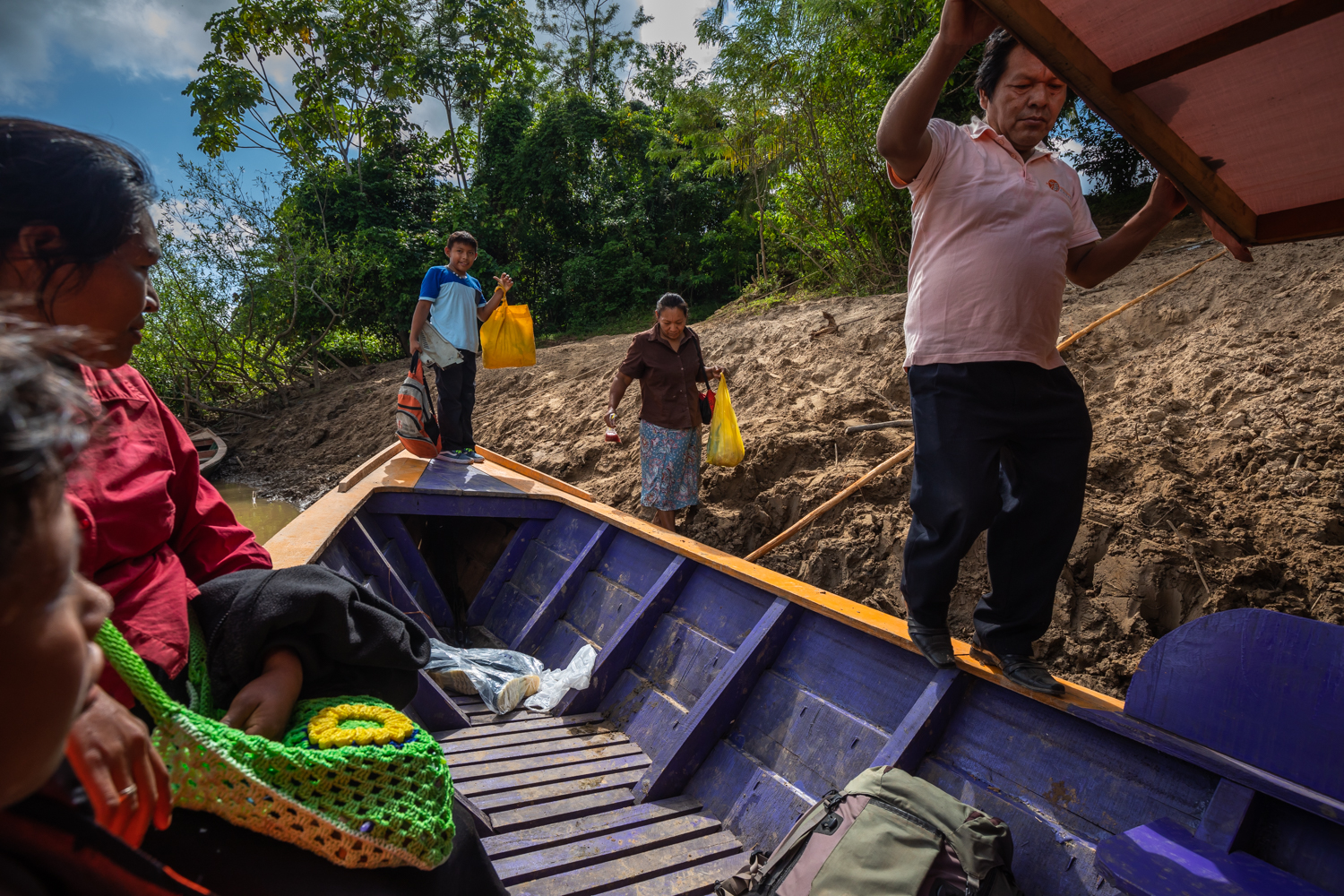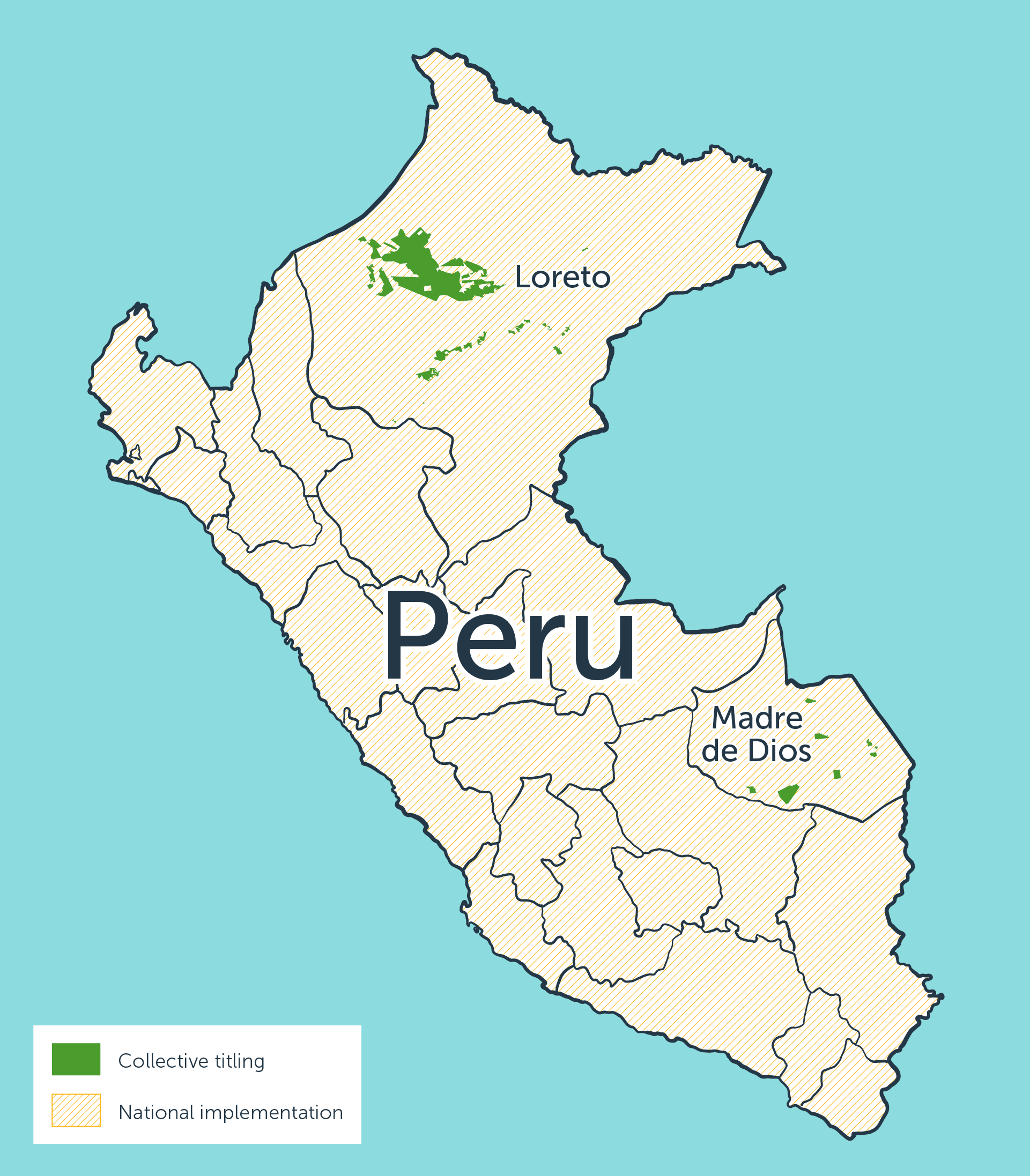Titling indigenous territories in Peru
Completed
From:
15/10/2017
To:
31/03/2020
Partners:
Peruvian Environmental Law Society (SPDA)
Associates:
Federations of indigenous communities in Loreto
Forest and Wildlife Service (SERFOR)
Interethnic Association for the Development of the Peruvian Rainforest (AIDESEP)
Loreto Regional Government (GOREL)
Ministry of Agriculture and Irrigation (MINAGRI)
Ministry of Culture (MINCUL)
Madre de Dios Regional Government (GOREMAD)
Native Federation of the River Madre de Dios and Tributaries (FENAMAD)
Stakeholders:
Indigenous Peoples and local communities in Loreto and Madre de Dios
The Peruvian Environmental Law Society (SPDA) is working with two national government ministries, two regional governments, and several federations of indigenous organizations to advance tenure security for Indigenous Peoples and local communities in Peru. Indigenous territories have insecure tenure throughout Peru and their territories and forests are threatened by overlapping rights, illegal mining and logging, and invasions. SPDA is supporting national and regional governments as they build their capacity to fulfil their obligations to title the territories of Indigenous Peoples and local communities. SPDA also aims to contribute to more effective and efficient implementation of ongoing donor-funded projects, valued at US$80 million, for collective titling of indigenous and local community territories nationwide. The initiative scales up an innovative partnership among an Indigenous People’s federation, an NGO and a regional government piloted by the Tenure Facility.
To read a brief overview of Peru, click here.
For a timeline of land and forest rights in Peru, click here.

"It is amply demonstrated that indigenous territories are fundamental for the conservation of the forests. In our areas, generally, deforestation is minimal. Therefore, today, one of the main strategies to counteract the loss and degradation of forests in the Peruvian Amazon is to ensure the safety, and sustainable management of these territories."
- Lizardo Cauper, President of AIDESEP
Project Overview
Goal
To provide legal security to indigenous and local communities territories by strengthening the institutional framework for land tenure.
Objectives
- Strengthen the capacity of MINAGRI, the lead government agency responsible for titling indigenous territories, MINCUL, and other key national and regional government ministries to carry out their obligations to title indigenous communities.
- Enhance collaboration among MINAGRI, MINCUL, other national and regional government agencies, indigenous organizations, civil society, and executors of titling projects.
- Secure collective tenure to land and forest in Loreto and Madre de Dios regions directly, and indirectly in other regions of Peru.
Actions
- Identify barriers to titling within national and international initiatives.
- Design and implement mechanisms to improve the operation and performance of national and international initiatives.
- Develop tools to integrate effective gender, intercultural, and conflict resolution approaches in Peru’s processes for titling the collective territories of indigenous and local communities.
- Analyze the technical and legal skills of officials within MINAGRI and MINCUL that they need to fulfil their responsibilities.
- Design and implement a capacity building programme.
- Support collaboration among MINCUL, MINAGRI, GOREL, GOREMAD and other national authorities, as well as indigenous organizations, civil society, and project implementers, to implement more efficient titling processes.
- Consider the technical, legal and economic feasibility of forest management by titled indigenous and local communities as an alternative to stop deforestation and mitigate climate change.
- Hire specialists to work within MINAGRI and MINCUL to support titling.

"Informal land tenure is one of the biggest characteristics of our country. For this reason, the Government’s actions are focused on facing this problem in order to fulfil the goals of national titling that we have imposed."
- Ronald Salazar, General Director of Sanitation of Agrarian Property and Rural Cadastre, Ministry of Agriculture
Expected results
- Strengthened capacity and coordination among MINCUL, MINAGRI, regional governments, and indigenous organizations to secure collective and Indigenous Peoples’ territories.
- More effective and efficient implementation of ongoing donor-funded projects, valued at US$80 million, for collective titling of indigenous and local community territories.
- Increased tenure security over five million hectares nationally, and 200,000 hectares in the regions of Loreto and Madre de Dios, benefitting more than 500 communities.
- Provision of technical assistance to the national DISPARC agency and Inter-American Development Bank-funded PTRT3 titling project.
- Supported development of national guidelines for the classification of soils, which is required for titling indigenous community lands.
Expected impact
- Peru’s national and regional governments implement national policy for titling territories of Indigenous Peoples and local communities.
- Legal security allows Indigenous Peoples and local communities to protect their territories, participate in economic development activities, and receive incentives for environmental services and REDD+
- Enhanced security of title benefits indigenous and local communities and the environment, mitigating deforestation and climate change.
